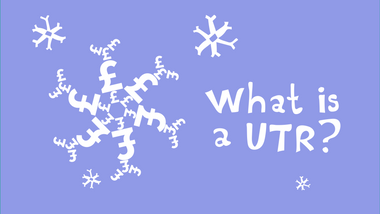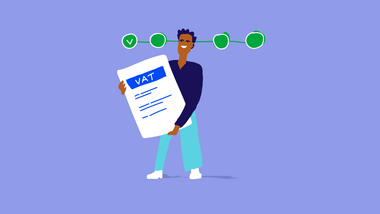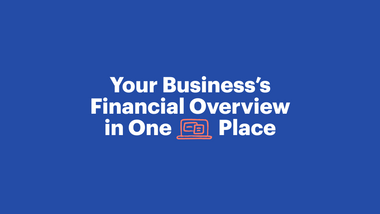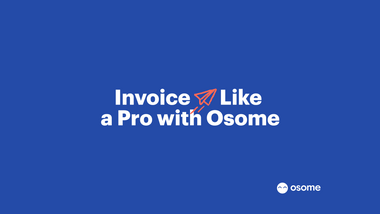Latest Posts

Financial Forecasting as a New Business

10 Ways ChatGPT Can Supercharge Your Small Business Without Breaking the Bank
Discover how ChatGPT can supercharge your UK small business. Streamline operations, enhance customer service, and gain a competitive edge without breaking the bank. Expert insights and real-life success stories await!
Better Business
 Money Talk
Money TalkGood News for Small Businesses in 2024 as the VAT Registration Threshold Increases
UK Chancellor delivered some good news for small businesses in the 2024 Spring Budget Speech. A lower VAT registration threshold will allow hundreds of businesses room to breathe. Read the Osome article for more.
·2 min read Better Business
Better BusinessChange Accountants for Your UK Business in 3 Easy Steps
Change accountants in just three simple steps so that your UK business gets the best accounting services. Let’s go through the main points in this post.
·4 min read Money Talk
Money TalkFinancial Forecasting as a New Business
Unleash the true potential of your startup with financial forecasting. You can drive success with reliable insights. Attracting investors becomes easier when you clearly understand your financial projections. Visit Osome today to access the tools to empower your startup's financial future.
·6 min read Better Business
Better BusinessWhat Is A Unique Taxpayer Reference (UTR) Number and How To Get One?
Learn about the Unique Taxpayer Reference (UTR) number, its importance for tax management in the UK, and the steps to get one. Also, find out how to recover a lost UTR and understand its role for both individuals and companies.
·8 min read Better Business
Better BusinessTrading Name: Definition and Distinction From Company Name
Grasping the distinction between a trading name and company name is crucial for businesses. Explore the unique characteristics, legal implications, and marketing potentials of a trading name, and learn how to leverage its advantages without compromising legal standing.
·6 min read Better Business
Better BusinessMemorandum of Association and the Foundation of a Company
Explore the importance of a memorandum of association in establishing a UK company. Learn about its key contents, from company name and objectives to share capital, and understand how careful drafting lays a solid foundation for growth and compliance.
·6 min read Better Business
Better BusinessHow MOMA Foods Found a Strategy for Its Porridge That Was Just Right
Dive into How Not To Fail, and the journey of MOMA Foods as they turned setbacks into opportunities, refined their products, and found innovative ways to reach their target audience. Learn valuable lessons on resilience and adaptability in the competitive food industry.
·6 min read Better Business
Better Business5 AI Tools Every Small Business Owner Should Know About
Discover how AI can boost your small business with Osome’s article. Learn how AI tools can transform operations, drive growth, and elevate customer experience. From automating repetitive tasks to creating compelling product imagery and managing finances, these top 5 AI tools have got you covered.
·6 min read Incorporation
Incorporation10 Steps To Starting an Online Business in 2024
Launch a successful online business in 2023 by following these 10 steps. From understanding the basics to driving traffic and setting up payment methods, Osome’s guide gives you a roadmap to a profitable venture. With expert insights and top tips, start your ecommerce journey with confidence.
·15 min read Better Business
Better Business10 Ways ChatGPT Can Supercharge Your Small Business Without Breaking the Bank
Discover how ChatGPT can supercharge your UK small business. Streamline operations, enhance customer service, and gain a competitive edge without breaking the bank. Expert insights and real-life success stories await!
·7 min read Incorporation
IncorporationHow To Find and View Your VAT Certificate Online
Struggling to find and view your VAT certificate online? This comprehensive guide will lead you through the process of accessing your VAT certificate, understanding its importance, and maintaining its validity. Equip yourself to handle your VAT obligations efficiently and legally.
·6 min read Better Business
Better BusinessWhat Is A Certificate of Good Standing for UK Companies?
Learn about the Certificate of Good Standing — your ticket to showcasing your company's integrity and reliability. Osome is here to guide you through the what, why, and how of this crucial business document. Be in the know, boost your reputation, and unlock global business opportunities.
·7 min read
Money Talk
 Money Talk
Money TalkGood News for Small Businesses in 2024 as the VAT Registration Threshold Increases
UK Chancellor delivered some good news for small businesses in the 2024 Spring Budget Speech. A lower VAT registration threshold will allow hundreds of businesses room to breathe. Read the Osome article for more.
·2 min read Better Business
Better BusinessChange Accountants for Your UK Business in 3 Easy Steps
Change accountants in just three simple steps so that your UK business gets the best accounting services. Let’s go through the main points in this post.
·4 min read Money Talk
Money TalkFinancial Forecasting as a New Business
Unleash the true potential of your startup with financial forecasting. You can drive success with reliable insights. Attracting investors becomes easier when you clearly understand your financial projections. Visit Osome today to access the tools to empower your startup's financial future.
·6 min read Better Business
Better BusinessWhat Is A Unique Taxpayer Reference (UTR) Number and How To Get One?
Learn about the Unique Taxpayer Reference (UTR) number, its importance for tax management in the UK, and the steps to get one. Also, find out how to recover a lost UTR and understand its role for both individuals and companies.
·8 min read Money Talk
Money TalkWhen Is a Company Audit Required?
Does your company need an audit? If it has a turnover of over £10.2 million, assets worth over £5.1 million, or 50+ employees, it does. Even small businesses can be audited if shareholders request. Learn about audit exemptions and how to prepare for your first audit here.
·4 min read Money Talk
Money TalkA Complete Guide To Ecommerce Accounting
Master ecommerce accounting with Osome’s comprehensive guide, covering bookkeeping, taxes, and more. Unlock financial insights to grow your online business and ensure compliance. Small business owners, don't miss out! Read the full article and elevate your financial game today.
·8 min read Money Talk
Money TalkHow Long To Keep Business Records in the UK? Introduction to Recordkeeping
Running a business in the UK is challenging, especially when you have to decide which business records to keep. However, recordkeeping is essential to a successful business, and a requirement to stay compliant with the law. Read on to find out all you need to know about recordkeeping in the UK.
·8 min read Money Talk
Money TalkSmall Business Grants: What Is Available in the UK This Year?
In this article, we run through the full list of grants available to small and medium-sized businesses across the UK. Discover the region-specific and UK grants that your business could be eligible for, and learn how you can apply for them. Let Osome lend a hand when you set up your business!
·16 min read Money Talk
Money TalkPost-Brexit VAT Rules on Services and Products
With the United Kingdom no longer a member of the EU’s single market and customs union, we’ve had to say goodbye to a few key processes. We’ve welcomed more import/export documentation, new post-Brexit VAT rules, and a new VAT system. We unpack it all here.
·15 min read Money Talk
Money Talk2023 Tax Deadlines in UK You Need To Know About
No one wants to miss any of the UK tax deadlines. It usually means an immediate fine and can put you in hot water with His Majesty’s Revenue and Customs (HMRC). But it can be easy to miss one, because there are quite a few UK tax year dates you need to be aware of.
·5 min read Money Talk
Money TalkHow To Accept Online Payments & the Best Gateway Payment
Discover how to optimize online payment methods for your ecommerce business in the UK, and explore the best gateway payment options, to act as the middleman between buyer and seller, and securely process your business’s online transactions.
·18 min read Better Business
Better BusinessFive Marketing Ideas To Combat the Costs of Paid Advertising
A steadily growing cost for business owners is advertising. With monthly budgets increasing, it’s time to utilise some ideas, easily implemented yourself, which can slash your costs.
·5 min read
That's Osome
 Money Talk
Money TalkFinancial Forecasting as a New Business
Unleash the true potential of your startup with financial forecasting. You can drive success with reliable insights. Attracting investors becomes easier when you clearly understand your financial projections. Visit Osome today to access the tools to empower your startup's financial future.
·6 min read Better Business
Better BusinessHow MOMA Foods Found a Strategy for Its Porridge That Was Just Right
Dive into How Not To Fail, and the journey of MOMA Foods as they turned setbacks into opportunities, refined their products, and found innovative ways to reach their target audience. Learn valuable lessons on resilience and adaptability in the competitive food industry.
·6 min read Better Business
Better Business5 AI Tools Every Small Business Owner Should Know About
Discover how AI can boost your small business with Osome’s article. Learn how AI tools can transform operations, drive growth, and elevate customer experience. From automating repetitive tasks to creating compelling product imagery and managing finances, these top 5 AI tools have got you covered.
·6 min read Better Business
Better Business10 Ways ChatGPT Can Supercharge Your Small Business Without Breaking the Bank
Discover how ChatGPT can supercharge your UK small business. Streamline operations, enhance customer service, and gain a competitive edge without breaking the bank. Expert insights and real-life success stories await!
·7 min read That’s Osome
That’s OsomeThe Secret to Turning Your Passion Into an Empowering Business
Discover the story of Moon Onyx Starr, a small business hero who found her life purpose and transformed it into a thriving venture. Learn how she empowers others to embrace their potential through personal and spiritual development, fostering a supportive community of like-minded individuals.
·4 min read That’s Osome
That’s OsomeHow One Woman’s Vision Is Changing the World of Female Wellness
Jemma’s journey to overcoming startup challenges in the sexual wellness industry. Check out Osome’s insights and takeaways for female entrepreneurs, including research, networking, self-belief, creating supportive environments, and empowering women in all aspects of business.
·4 min read That’s Osome
That’s OsomeOsome Heroes – Abi Shokeye of Rich Skxn
Discover the inspiring journey of Abi Shokeye, founder of Rich Skxn, a marketplace and communal space for black and brown skincare. Starting from her personal struggle with finding skincare products for melanin-rich skin, Abi became a problem solver and built a successful business.
·4 min read That’s Osome
That’s Osome6 Things I Wish I Knew Before Starting My Side Hustle
Osome shares the top tips from the recent webinar with two entrepreneurs in the ecommerce space, Zain Shah and Ben Alistor. We discussed knowing when it’s time to take the leap, discovering which business is right for you, and what they wish they’d known before starting a side hustle.
·6 min read Money Talk
Money TalkWhy Business Owners Need an All-in-One Accounting Dashboard
Never lose sight of how your business is performing with Osome’s all-in-one accounting dashboard. From profits and losses to checking your bank balance, we make it easy for you to keep tabs on your business’s financial health.
·3 min read Better Business
Better BusinessEntrepreneur Spencer Matthews On Tips For Launching Your Business
For those bored with the 9-5 or ready to scale up their side hustle, TV’s Spencer Matthews shares his top insights and practical advice on levelling up and earning extra income.
·4 min read That’s Osome
That’s OsomeGet Paid Faster With Osome Invoices
The best part? It’s free. Nada, nothing, goose egg. All of our customers will get access with no extra fee. It’s available for you to use within the Osome app. Invoicing will launch on mobile (Android/iOS) shortly.
·3 min read That’s Osome
That’s OsomeHow Foggywipe Grew Sales Instead Of Spending 300 Hours A Year On Accounting
Webb had good sales coming to his online shop especially when he launched Facebook ads. However, when it came to bookkeeping and accounting, he had no clue about what to do.
·2 min read

What Is A Unique Taxpayer Reference (UTR) Number and How To Get One?
Learn about the Unique Taxpayer Reference (UTR) number, its importance for tax management in the UK, and the steps to get one. Also, find out how to recover a lost UTR and understand its role for both individuals and companies.

Trading Name: Definition and Distinction From Company Name
Grasping the distinction between a trading name and company name is crucial for businesses. Explore the unique characteristics, legal implications, and marketing potentials of a trading name, and learn how to leverage its advantages without compromising legal standing.

Memorandum of Association and the Foundation of a Company
Explore the importance of a memorandum of association in establishing a UK company. Learn about its key contents, from company name and objectives to share capital, and understand how careful drafting lays a solid foundation for growth and compliance.

When Is a Company Audit Required?
Does your company need an audit? If it has a turnover of over £10.2 million, assets worth over £5.1 million, or 50+ employees, it does. Even small businesses can be audited if shareholders request. Learn about audit exemptions and how to prepare for your first audit here.

How MOMA Foods Found a Strategy for Its Porridge That Was Just Right
Dive into How Not To Fail, and the journey of MOMA Foods as they turned setbacks into opportunities, refined their products, and found innovative ways to reach their target audience. Learn valuable lessons on resilience and adaptability in the competitive food industry.

5 AI Tools Every Small Business Owner Should Know About
Discover how AI can boost your small business with Osome’s article. Learn how AI tools can transform operations, drive growth, and elevate customer experience. From automating repetitive tasks to creating compelling product imagery and managing finances, these top 5 AI tools have got you covered.

10 Steps To Starting an Online Business in 2024
Launch a successful online business in 2023 by following these 10 steps. From understanding the basics to driving traffic and setting up payment methods, Osome’s guide gives you a roadmap to a profitable venture. With expert insights and top tips, start your ecommerce journey with confidence.

10 Ways ChatGPT Can Supercharge Your Small Business Without Breaking the Bank
Discover how ChatGPT can supercharge your UK small business. Streamline operations, enhance customer service, and gain a competitive edge without breaking the bank. Expert insights and real-life success stories await!




